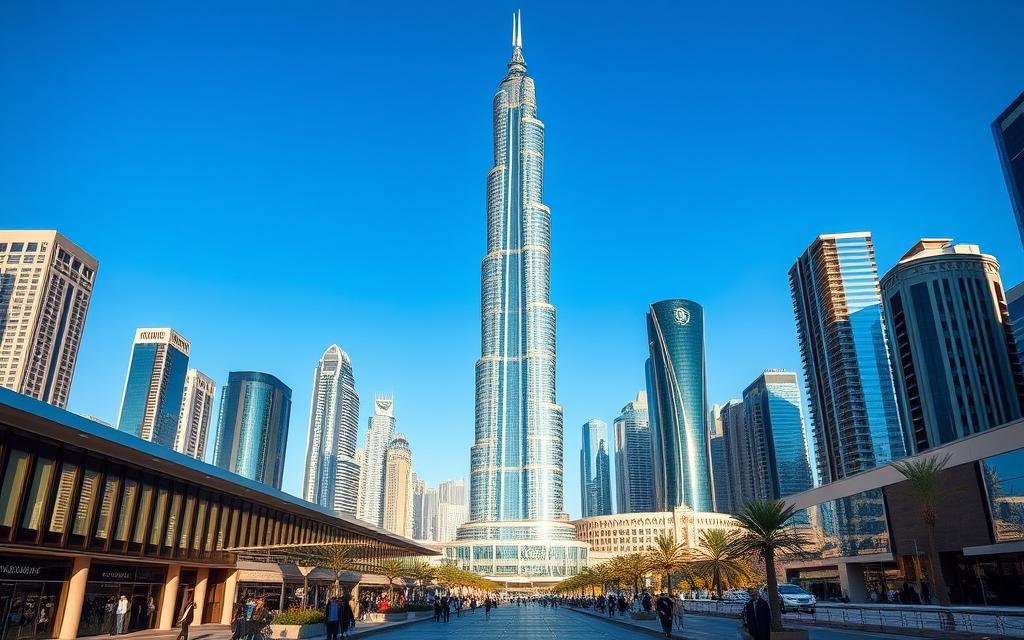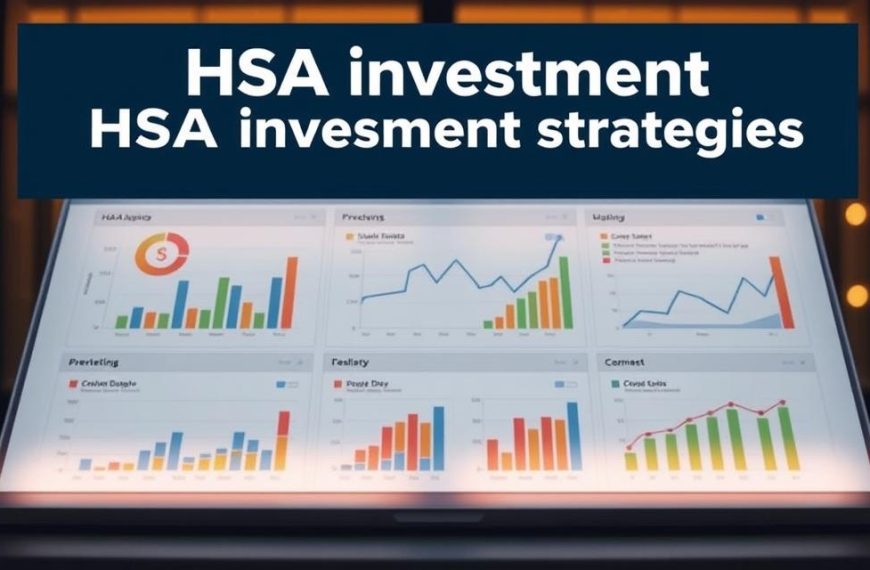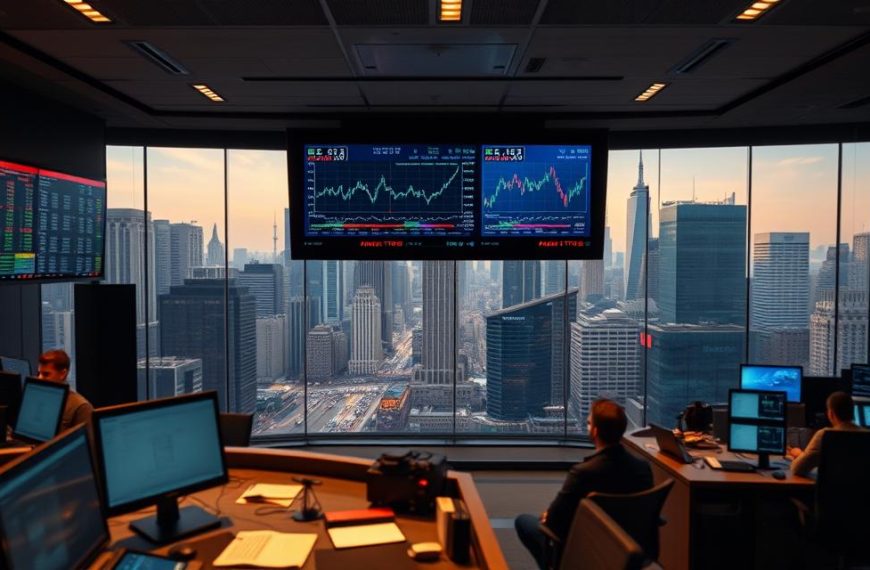Dubai’s thriving economy and tax-free environment make it an attractive destination for investors looking to grow their wealth. The city’s strategic location and business-friendly policies have created a favourable market for various investments.
With a robust financial system and a wide range of investment options, Dubai offers a unique chance for individuals to diversify their portfolio and manage risk. Whether you’re an expat or a resident, understanding the local market and available investments is crucial for making informed decisions about your money.
As a hub for investors, Dubai provides an opportunity to engage in various investment activities, from stocks and bonds to real estate and Islamic finance options, allowing individuals to grow their money effectively.
Dubai’s Investment Landscape and Opportunities
Dubai’s investment landscape is characterized by its strategic global position, making it an ideal hub for international trade and finance. The emirate’s economy is diversified, with key sectors including finance, real estate, tourism, and trade, providing a robust foundation for investment opportunities.
Dubai’s Strategic Position in the Global Economy
Dubai’s geographical location between Europe and Asia makes it a crucial trade hub, facilitating the flow of goods, services, and investment between East and West. The city’s state-of-the-art infrastructure, including its world-class airports and logistics facilities, further enhances its appeal to investors. Moreover, Dubai’s business-friendly environment, coupled with its stable political and economic climate, makes it an attractive destination for foreign investment.
| Economic Sector | Key Features | Benefits to Investors |
|---|---|---|
| Finance | Advanced banking system, Islamic finance options | Access to diverse financial instruments |
| Real Estate | Freehold property ownership, luxury developments | Attractive rental yields, capital appreciation |
| Tourism | World-class tourist infrastructure, iconic landmarks | Opportunities in hospitality and tourism-related businesses |
Tax Advantages for Investors
The UAE’s fiscal policy is highly favourable for investors, with no personal income tax levied on individuals. This, combined with other tax advantages, makes Dubai an expat haven. Key tax benefits include:
- No capital gains tax on profits from stock market investment
- Competitive corporate tax rates, with exemptions available in free zones
- No withholding tax on dividend income
- Extensive network of double taxation agreements to prevent double taxation
These factors contribute to Dubai’s attractiveness as an investment destination, offering investors a unique combination of strategic location, economic stability, and favourable tax environment.
Financial Preparation Before Investing
Before diving into Dubai’s vibrant investment scene, it’s crucial to lay a solid financial foundation. This preparation ensures that investors can make informed decisions and navigate the market with confidence.
Creating a Budget Using the 50/30/20 Rule
A well-structured budget is the cornerstone of financial preparation. The 50/30/20 rule is a simple yet effective way to allocate one’s income. By dedicating 50% of your income to necessary expenses, 30% to discretionary spending, and 20% to saving and debt repayment, you can achieve a balanced financial life. This rule helps in prioritizing investment and savings, ensuring that you have sufficient capital to invest.
Building an Emergency Fund
An emergency fund is a critical component of financial preparation. It serves as a buffer against unexpected expenses, such as medical emergencies or job loss, preventing the need to liquidate investments prematurely. For expats in Dubai, it’s advisable to save even more due to potential repatriation costs.
- Establishing an emergency fund with 3-6 months of living expenses is a crucial first step before investing in Dubai’s markets.
- The fund should be kept in highly liquid accounts, such as savings accounts or short-term deposits, prioritizing accessibility over returns.
- Consider maintaining emergency funds in both local AED and your home currency to mitigate risk.
| Emergency Fund Considerations | Recommended Allocation | Benefits |
|---|---|---|
| Liquidity | Highly Liquid Accounts | Ease of Access |
| Currency Risk | AED and Home Currency | Mitigated Currency Risk |
| Expense Coverage | 3-6 Months Expenses | Financial Security |
By creating a budget and building an emergency fund, investors can ensure they have the necessary money to make informed investment decisions, manage risk, and protect their capital.
How to Invest Money in Dubai: Essential Principles
Effective investing in Dubai hinges on mastering essential investment principles. A well-informed investor is better equipped to navigate the complexities of the market and make decisions that align with their financial goals.
Long-term vs Short-term Investment Strategies
Investors in Dubai must decide between long-term and short-term investment strategies. Long-term investing involves holding onto investments for an extended period, typically several years or even decades. This approach can help ride out market fluctuations and benefit from compound interest. For instance, investing AED 10,000 monthly for 10 years in a portfolio with an 8% annual return can yield AED 1,824,086.73. In contrast, short-term investing focuses on quicker returns, often with higher risks.
About 75% of those interviewed by Ramsey Solutions attributed their success to regular and consistent investing over a long period. This statistic underscores the potential benefits of adopting a long-term investment strategy.
Risk Management and Diversification
Effective risk management is crucial in Dubai’s investment landscape. Understanding your risk tolerance based on age, financial goals, and comfort with market volatility is essential. Diversification across various asset classes, such as stocks, bonds, real estate, and commodities, helps reduce portfolio risk by spreading exposure across investments that respond differently to market conditions.
- Diversify your portfolio across asset classes to minimize risk.
- Consider geographic diversification to balance local and international investments.
- Currency diversification can protect against exchange rate fluctuations.
- Regular portfolio rebalancing is necessary to maintain target asset allocations.
By understanding the correlation between different investments, you can create a truly diversified portfolio where assets don’t all move in the same direction simultaneously.
UAE Stock Market Investment Options
With its strategic location and tax advantages, the UAE stock market is an attractive destination for investors. To invest in the UAE stock market, you will need a stockbroker, who will provide you access to any of the three stock exchanges in the UAE — Dubai Financial Market (DFM), NASDAQ Dubai, and Abu Dhabi Securities Exchange (ADX).
Dubai Financial Market (DFM)
The DFM is one of the primary stock exchanges in the UAE, offering a platform for investors to buy and sell securities. It is known for its diverse listings, including companies from various sectors.
Abu Dhabi Securities Exchange (ADX)
The Abu Dhabi Securities Exchange (ADX) was established in 2000 and has grown to become one of the largest exchanges in the Middle East region. The ADX focuses heavily on energy, banking, and telecommunications sectors, reflecting Abu Dhabi’s economic strengths and state-owned enterprises.
- Many ADX-listed companies offer attractive dividend yields, making them appealing for income-focused investors seeking regular cash flows.
- The exchange operates on the same Sunday to Thursday schedule as the DFM, with trading hours from 10:00 AM to 2:00 PM.
- The ADX General Index serves as the primary benchmark for tracking the performance of stocks listed on the exchange.
- Investors can access the ADX through the same brokers that provide access to the DFM, with many offering integrated platforms for trading on both exchanges.
Both the DFM and ADX offer a range of investment opportunities, catering to different investor preferences and strategies. By understanding the characteristics of each exchange, investors can make informed decisions about where to invest their money.
Investing in International Stocks from Dubai
Investing in international stocks from Dubai offers a gateway to global markets, enabling investors to diversify their portfolios.
To invest in international stocks, Dubai-based investors need to select a suitable brokerage platform that provides access to global stock exchanges such as the New York Stock Exchange (NYSE) and NASDAQ.
Selecting a Suitable Brokerage Platform
Choosing the right brokerage platform is crucial for investing in international stocks. Investors should consider factors such as fees, customer service, and the range of international markets available.
A suitable brokerage platform should offer competitive fees, robust customer support, and access to a wide range of international stocks.
Understanding Foreign Investment Regulations
Foreign investment regulations vary significantly across different markets. Dubai-based investors must understand the specific rules governing each jurisdiction they wish to invest in.
- Key Considerations:
- US markets require non-US investors to complete W-8BEN forms to establish tax treaty benefits and avoid excessive withholding taxes on dividends.
- European markets have different regulatory frameworks, with MiFID II rules affecting how brokers report transactions and protect investor assets.
- Some emerging markets impose foreign ownership limits or require special investor qualifications.
- Dubai-based investors should be aware of potential estate tax implications in foreign jurisdictions.
- Currency controls in certain countries may affect the ability to repatriate investment proceeds back to the UAE.
By understanding these regulations and selecting a suitable brokerage platform, investors in Dubai can successfully invest in international stocks, diversifying their portfolios and potentially achieving higher returns.
Bond Investments for Stable Returns
For investors seeking predictable returns, bond investments offer a reliable alternative to the volatility of the stock market. Bonds are debt instruments issued by governments and corporations to raise capital, providing investors with regular income through interest payments.
Government and Corporate Bonds
There are several types of bonds available to investors, including government and corporate bonds. Government bonds, such as treasury bonds, are issued by national governments to finance public projects, while corporate bonds are issued by companies to raise capital for various purposes. Both types offer fixed interest rates, making them attractive to investors seeking stable income.
Investors can benefit from bonds in two primary ways: through regular interest payments and potential capital appreciation. When interest rates fall, existing bonds with higher interest rates become more valuable, allowing investors to sell them at a premium.
Sukuk (Islamic Bonds)
For investors looking for Sharia-compliant investment options, sukuk, or Islamic bonds, offer an attractive alternative. Sukuk represent ownership in an underlying asset and provide returns based on the performance of that asset, rather than interest payments. The UAE government and major corporations regularly issue sukuk, providing a range of investment opportunities for those seeking Islamic finance options.
- Sukuk are Sharia-compliant financial certificates representing ownership in an underlying asset.
- Dubai has established itself as a global hub for sukuk issuance, with the Dubai International Financial Centre (DIFC) providing the necessary regulatory framework.
- The UAE government and major corporations regularly issue sukuk, offering ample investment opportunities.
For more detailed information on investment opportunities, investors can refer to the CIO Monthly Investment Report for insights into various investment products, including bonds and sukuk.
Mutual Funds and ETFs for Diversification
Investing in mutual funds and ETFs can be a strategic way to diversify your portfolio in Dubai’s financial market. These investment vehicles allow individuals to spread their risk across various asset classes, potentially leading to more stable returns over time.
Passive vs Active Investment Strategies
When considering mutual funds and ETFs, it’s essential to understand the difference between passive and active investment strategies. Passive investing involves tracking a market index, such as the FTSE 100, to replicate its performance. This approach is often associated with lower fees. On the other hand, active management involves a fund manager actively selecting securities to buy and sell, aiming to outperform the market. The choice between these strategies depends on your investment goals, risk tolerance, and belief in the fund manager’s ability to outperform the market.
How to Select the Right Fund for Your Goals
Selecting the right mutual fund or ETF requires careful consideration of several factors. To begin, clearly define your investment goals, time horizon, and risk tolerance. Then, evaluate the fund’s investment objective to ensure it aligns with yours. Assess the fund’s past performance over multiple time periods and compare it to appropriate benchmarks. It’s also crucial to scrutinise the expense ratio, as even small differences can significantly impact long-term returns. Additionally, consider the fund manager’s experience for actively managed funds and review the fund’s asset allocation to ensure it complements your existing portfolio.
To diversify your portfolio effectively, consider the following key points:
* Begin by defining your investment goals and risk tolerance.
* Evaluate the fund’s investment objective and past performance.
* Scrutinise the expense ratio and consider the fund manager’s experience.
* Review the fund’s asset allocation and holdings.
* For expatriates in Dubai, consider the fund’s base currency and currency hedging.
* Examine the fund’s size and its implications for strategy and growth.
Real Estate Investment in Dubai
Dubai’s real estate investment landscape is thriving, offering a range of options for expats and residents alike. With its robust economy and investor-friendly policies, Dubai has become a hub for international investors.
The city’s real estate market has seen significant growth, driven by its strategic location, tax advantages, and world-class infrastructure. Investing in Dubai property is not only a good fiscal investment but also offers certain privileges to non-resident investors, particularly in terms of residency.
Residential Property Investment
Residential property investment in Dubai is an attractive option due to the high rental yields. The average annual rental yield in Dubai is between 8.5% and 11%, according to Bayut, a leading real estate platform in the UAE. This makes real estate one of the best investments in Dubai.
Investors can choose from a variety of residential properties, including apartments and villas, in different locations such as Downtown Dubai, Dubai Marina, and other popular areas.
Commercial Property Investment
Commercial real estate in Dubai offers diversification opportunities with office spaces, retail units, warehouses, and mixed-use developments available to investors. Office properties in business districts like DIFC and Business Bay typically command premium rents.
Retail spaces in established malls and community centres provide stable income streams. Industrial and logistics properties have gained popularity due to Dubai’s position as a regional trade hub, with warehouses in areas like Dubai South and Jebel Ali in high demand.
Commercial leases in Dubai are typically longer than residential agreements, providing more stable and predictable cash flows. Yield rates for commercial properties range from 7-9% for prime office space to 8-10% for industrial properties, depending on location and quality.
Real Estate Investment Trusts (REITs)
For investors looking to tap into Dubai’s real estate without directly owning properties, REITs are an attractive option. REITs allow individuals to invest in a diversified portfolio of properties, providing a steady income stream without the need for direct property management.
Benefits over Direct Property Ownership
The benefits of REITs over direct property ownership include diversification, liquidity, and professional management. By investing in REITs, investors can spread their risk across various property types and locations, reducing their exposure to market fluctuations.
REITs are particularly appealing to investors seeking passive income, as they are required to distribute a significant portion of their income to shareholders.
Top Performing REITs in the UAE
There are currently two REITs listed on Nasdaq Dubai: Emirates REIT and ENBD REIT. Emirates REIT focuses on education and commercial properties, with assets including Index Tower in DIFC and several school buildings.
ENBD REIT, managed by Emirates NBD Asset Management, maintains a diversified portfolio across office, residential, and alternative property sectors throughout Dubai. Both REITs offer attractive dividend yields, ranging from 5-8% annually.
When evaluating REITs, investors should consider performance metrics such as dividend consistency, net asset value growth, occupancy rates, and the quality of the underlying property portfolio.
Fixed-Income Securities and Certificates of Deposit
For investors seeking predictable returns, fixed-income securities are a viable option in Dubai. These securities provide a regular income stream and are generally considered lower risk compared to equity investments.
Types of Fixed-Income Securities Available
Investors in Dubai can access a variety of fixed-income securities, including certificates of deposit (CDs), treasury notes, treasury bonds, and treasury bills. CDs are time deposits offered by banks with a fixed interest rate and maturity date. Treasury notes and bonds are government debt securities with maturities ranging from less than a year to over 10 years, offering regular coupon payments.
Treasury bills, on the other hand, are short-term government securities with maturities of up to 52 weeks, sold at a discount to their face value.
Risk and Return Profiles
Fixed-income securities carry different levels of risk, affecting their potential returns. The main types of risk include interest rate risk, inflation risk, credit risk, and liquidity risk.
| Security Type | Risk Level | Typical Returns |
|---|---|---|
| Government Securities | Low | 1-3% |
| Corporate Bonds | Moderate | 3-6% |
| High-Yield Bonds | High | 7-10% |
Understanding these risks is crucial for making informed investment decisions. Investors should assess their risk tolerance and financial goals when selecting fixed-income securities.
Islamic Investment Options in Dubai
For investors seeking Shariah-compliant investment opportunities, Dubai presents a compelling landscape. The city is home to a growing Islamic finance sector, offering a range of products that cater to the needs of Muslim investors.
Principles of Islamic Finance
Islamic finance operates based on Shariah principles, which prohibit the collection and payment of interest. Instead, Islamic financial products are structured around risk-sharing and asset-backed transactions.
Available Shariah-Compliant Investment Products
Several Shariah-compliant investment products are available in Dubai, including:
- Islamic Mutual Funds: These funds screen investments according to Shariah principles, excluding companies with excessive debt, interest income, or involvement in prohibited activities.
- Sukuk (Islamic Bonds): Sukuk structures returns based on asset ownership, profit-sharing, or lease arrangements rather than interest payments.
- Islamic ETFs: Islamic ETFs track indices of Shariah-compliant companies, offering diversification while adhering to religious principles.
- Takaful: Takaful provides an Islamic alternative to conventional insurance, operating on principles of mutual cooperation and shared responsibility.
- Islamic Real Estate Funds: These funds invest in property using Shariah-compliant financing structures and avoid tenants engaged in prohibited activities.
Major financial institutions in Dubai, such as Dubai Islamic Bank and Emirates Islamic, offer comprehensive suites of Shariah-compliant investment products. Investors can choose from a variety of options to create a diversified portfolio that aligns with their financial goals and religious beliefs.
Building a Diversified Investment Portfolio
Diversification is key to managing risk and maximising returns in investment portfolios. A well-diversified portfolio can help investors navigate market volatility and achieve their long-term financial goals.
Asset Allocation Based on Risk Tolerance
Asset allocation is a critical component of building a diversified portfolio. It involves dividing investments among different asset classes, such as stocks, bonds, and real estate, based on an individual’s risk tolerance and investment objectives.
Investors with a higher risk tolerance may allocate a larger proportion of their portfolio to stocks, while those with a lower risk tolerance may prefer a more conservative allocation to bonds and other fixed-income securities.
Portfolio Rebalancing Strategies
Rebalancing is essential to maintaining a diversified portfolio over time. It involves periodically adjusting investment holdings to maintain the target asset allocation as market movements cause these proportions to drift.
- Calendar-based rebalancing establishes regular intervals (quarterly, semi-annually, or annually) to review and adjust portfolio allocations regardless of market conditions.
- Percentage-based rebalancing triggers adjustments when asset allocations drift beyond predetermined thresholds (typically 5-10% from targets) rather than at fixed intervals.
- Tactical rebalancing incorporates market outlook and economic conditions into the rebalancing decision, temporarily overweighting or underweighting certain assets.
- Tax-efficient rebalancing strategies include directing new investments toward underweight assets and using tax-advantaged accounts for frequent adjustments.
By implementing a disciplined rebalancing strategy, investors can ensure that their portfolio remains aligned with their investment objectives and risk tolerance.
Investment Strategies for Different Life Stages
As investors progress through different life stages, their investment strategies must adapt to changing financial goals and risk tolerance. What works for a young professional may not be suitable for someone nearing retirement.
Young Professionals and Early Career Investors
Young professionals and early career investors typically have a longer investment horizon, allowing them to take on more risk in their investment portfolios. They can focus on growth-oriented strategies, such as investing in stocks or real estate, to build wealth over time.
Pre-Retirement and Retirement Planning
As investors approach retirement, their focus shifts from accumulation to preservation and generating income. Pre-retirement investors should gradually transition to more conservative allocations to protect their accumulated wealth. Developing multiple income streams becomes crucial, with dividend-paying stocks, bonds, and rental properties creating cash flow to replace employment income.
| Life Stage | Investment Strategy | Risk Level |
|---|---|---|
| Young Professionals | Growth-oriented | High |
| Pre-Retirement | Conservative | Low-Moderate |
| Retirement | Income-generating | Low |
Expatriates approaching retirement should clarify their long-term residency plans, as this impacts currency allocation and liquidity requirements. The “bucket strategy” can be employed, separating investments into near-term, medium-term, and long-term needs, with decreasing risk profiles.
Reviewing and updating estate planning documents becomes increasingly important, particularly for cross-border assets held by expatriates. Retirees in Dubai should consider the sustainability of their withdrawal rate, with 3-4% of portfolio value annually generally considered sustainable.
Legal Considerations for Expat Investors
Dubai’s attractive investment opportunities come with specific legal considerations that expat investors must be aware of. Understanding these legal aspects is crucial for ensuring compliance with local laws and maximizing investment returns.
Residency Requirements and Investment Visas
One of the key legal considerations for expat investors is obtaining the appropriate residency visa. Dubai offers various visa options, including the Dubai Property Visa scheme, which grants residency based on the value of the investment. For instance, investing a minimum of 750,000 AED in a property can secure a three-year visa, while a ten-year investor visa requires a public investment of at least 10 million AED.
Residency visa options in Dubai:
| Visa Duration | Minimum Investment Required |
|---|---|
| 3 years | 750,000 AED |
| 5 years | Higher investment threshold |
| 10 years | 10 million AED in public investments |
Inheritance Laws and Estate Planning
Estate planning is another critical area for expat investors. UAE inheritance laws are based on Sharia principles, which may differ significantly from the laws in an expatriate’s home country. This can affect how assets are distributed upon death.
Key considerations include:
- Non-Muslim expatriates can register a will with the DIFC Wills Service Centre to ensure their UAE assets are distributed according to their wishes.
- Without a registered will, UAE courts may apply Sharia inheritance rules, allocating fixed shares to certain family members.
- Joint property ownership between spouses does not automatically confer inheritance rights in the UAE.
- Investment accounts should have nominated beneficiaries to facilitate smoother asset transfers.
Regular review of estate planning documents is essential, particularly following major life events or changes to UAE inheritance regulations. Expatriates should consider seeking professional advice to ensure their estate plans are aligned with their wishes and compliant with local laws.
Protecting Your Investments Against Inflation
Inflation can significantly erode the value of your investments, making it essential to adopt strategies that safeguard your portfolio. As inflation rises, the purchasing power of money decreases, affecting the real returns on investments.
To mitigate the adverse effects of inflation, investors can consider various asset classes and strategies.
Inflation-Resistant Asset Classes
Certain asset classes have historically performed well during periods of inflation. These include:
- Commodities, such as gold and oil, which tend to increase in value as inflation rises.
- Real estate, as property values and rental income often increase with inflation.
- Inflation-indexed bonds, which adjust their returns based on inflation rates.
Diversification across these asset classes can provide a natural hedge against inflation, as underperformance in inflation-vulnerable investments may be offset by outperformance in inflation-resistant ones.
Hedging Strategies for Uncertain Times
In addition to investing in inflation-resistant assets, several hedging strategies can be employed to protect investments against inflation and associated risk:
- Currency diversification to protect against local currency devaluation.
- Options strategies, including purchasing put options on vulnerable positions or call options on inflation-resistant assets.
- Maintaining shorter duration in fixed-income holdings to reduce sensitivity to inflation-driven interest rate increases.
- Alternative investments like private equity and venture capital, which can offer inflation protection through operational improvements.
By adopting these strategies, investors can better protect their portfolio against the erosive effects of inflation and ensure more stable returns on their investments.
Conclusion
For expats and residents alike, Dubai presents a compelling case for investment due to its tax advantages and growth potential. The city’s unique investment landscape is characterised by its strategic location, diverse opportunities across multiple asset classes, and a range of financial instruments.
Successful investing in Dubai begins with proper financial preparation, including establishing a budget and building an adequate emergency fund. Understanding the fundamental principles of investing, such as the power of compounding, risk management, and diversification, provides a solid foundation for effective wealth building.
The Dubai financial market offers various investment options, including local stock markets and international brokerage platforms. Investments can be made in fixed-income securities like bonds and sukuk, mutual funds, ETFs, and real estate, either directly or through REITs.
Building a diversified portfolio requires thoughtful asset allocation based on personal risk tolerance and regular rebalancing. Investment strategies should evolve through different life stages, from growth-focused approaches in early career to income and preservation priorities near retirement.
By applying the principles and strategies outlined in this guide, both expatriates and residents can effectively manage their money and investments in Dubai to build lasting wealth and achieve their financial goals.























